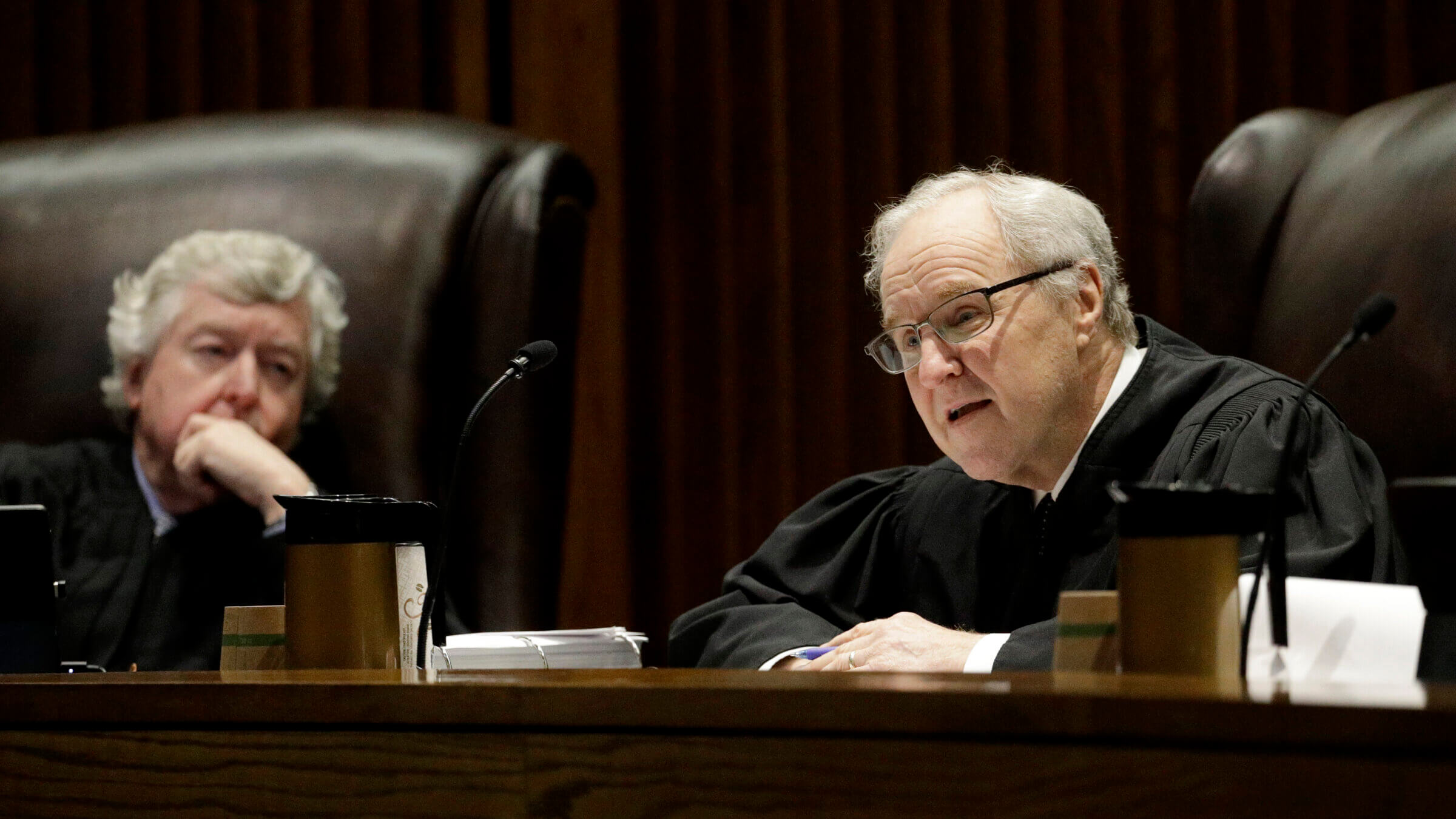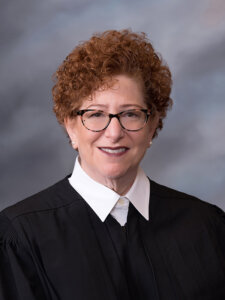Meet the Jewish judge who helped protect abortion in Kansas
Eric Rosen joined the 2019 Kansas Supreme Court decision that found a constitutional right to abortion

Kansas Supreme Court Justice Eric Rosen, right, was part of a 6-1 ruling in 2019 that found the state constitution protected the right to abortion. Opponents of the procedure attempted to overturn that decision with a ballot measure but voters overwhelmingly rejected it Tuesday, in a closely watched contest that followed overturning of Roe v. Wade in June. Photo by Associated Press
There aren’t many Jews in Kansas, but from his seat on the state’s Supreme Court, one Jewish justice helped enshrine abortion rights in the state. Kansas voters affirmed those rights Tuesday, defeating a ballot measure that would have made it possible for state lawmakers to severely restrict or even ban abortion.
Judge Eric Rosen has long been part of the small Jewish community in the capital of Topeka.

Richard Levy, who grew up across the street from Rosen, said there was only one other Jewish student in his grade. He recalled being forced to choose between staying alone in an empty classroom or joining his classmates rehearsing Christmas carols in the gymnasium.
“It was that kind of experience,” said Levy, who is now a constitutional law professor at the University of Kansas.
Rosen, who did not respond to an interview request, does not appear to have spoken publicly about his Judaism but lists membership at Topeka’s Reform Temple Beth Shalom in his official court biography.
Much of the Sunflower State’s small Jewish community – estimated at 15,000 to 30,000 out of 3 million Kansans – was vocally opposed to the proposed “Value Them Both” amendment to the state constitution. It aimed to overturn the state Supreme Court’s 6-1 ruling from three years ago that found the Kansas state constitution protected abortion rights. It was the first opportunity for voters anywhere in the country to directly weigh in on abortion after the U.S. Supreme Court overturned Roe v. Wade in June.
Though Gov. Laura Kelly is a Democrat, Republicans have controlled both houses of the state legislature for nearly 30 years and former President Donald Trump won the state by 15 points. Abortion opponents hoped that Kansans, many of whom are evangelical Christians, would eagerly vote to remove abortion rights from the constitution.
Prominent Jewish voices who sought to prove otherwise included Rabbi Mark Levin, the founder of Congregation Beth Torah in suburban Kansas City, who went on television last week to oppose the amendment, joining three other pulpit rabbis from the region who had also spoken against it.
Sharon Brett, legal director at the ACLU of Kansas, invoked her Jewish faith in an op-ed about abortion rights for the Kansas Reflector in July and said she was heartened to see the amendment resoundingly defeated last night.
“As a Jewish woman living in a state that — at times — appears to be controlled by a very conservative Christian approach,” Brett said in an interview, “it was a beautiful day for Kansans.”
The ruling
By rejecting the amendment, Kansas voters left in place the 2019 decision by Rosen and five of his fellow justices in Hodes & Nauser v. Schmidt. That landmark ruling validated a new legal theory advanced by the Center for Reproductive Rights on behalf of two Kansas physicians that held the state’s constitution protected the right to abortion.
While Rosen did not author the decision, he was an active participant in oral arguments before the court in 2017. Rosen did not telegraph his eventual position, but asked the attorney representing the two doctors a question that would take on new significance after Roe v. Wade was overturned.

“Do you suggest that the founders of our state constitution intended to follow whatever guidelines the United States Supreme Court established and apply it to Kansas?” Rosen asked. “Is that what the founders intended?”
By identifying a right to abortion in the state constitution, Rosen and his colleagues effectively aligned themselves with the longstanding position of the U.S. Supreme Court. But because of the decision, even after the Supreme Court’s June ruling in Dobbs v. Jackson Women’s Health Organization that the federal constitution does not protect the right to an abortion, the Kansas constitution continued to protect abortion access for Kansans.
Levy, the law professor, said that the Kansas court has a reputation for being nonpartisan and that legal observers were unsure where the justices would land on the case. The state relies on a civilian panel to select court nominees on merit and the governor then selects from one of the three approved candidates.
A second Jewish justice
Rosen, 69, was joined by another Jewish judge on the Supreme Court two years ago when Melissa Taylor Standridge was elevated from the Kansas Court of Appeals where she had also ruled in favor of a constitutional protection for abortion rights before the Hodes case reached the Supreme Court.
Standridge, who became the first Jewish woman to be named to the court, previously served as vice chair of the local Jewish Community Relations Bureau and told the Kansas City Jewish Chronicle that “the Jewish religion is an ethical religion and pursuing justice is a core principle that runs through Jewish history and Jewish tradition.”
Marcia Rittmaster belongs to Beth Torah in Overland Park and volunteered with the campaign opposed to the constitutional amendment. She’s related to Standridge and said she appreciated having multiple Jewish members of the Supreme Court.

“Jews feel underrepresented in Kansas,” Rittmaster said. “We’re a small part of the population so we just kind of accepted it – but it’s really thrilling to know we have it.”
Rosen was appointed by Gov. Kathleen Sebelius, a Democrat, in 2005 after serving as a trial judge since 1993.
“I have always been very deliberate, clear and concise in my decisions and never tried to have my own opinions expressed in my decisions,” Rosen said when asked to explain his judicial approach at the time.
He was welcomed by both the legal community and political leaders, including Republicans. “I’m very impressed not only with his intelligence, but his sense of fairness,” John Vratil, the state senate judiciary committee chairman, told the Lawrence Journal-World after Rosen’s appointment.
Rosen never strayed far from Topeka, beginning his career as a social worker in the city before attending the law school at Washburn University and working as a public defender and prosecutor before becoming a district court judge hearing criminal cases. “I am always amazed at the resiliency of the human spirit that I see in my courtroom,” he told a Washburn publication after being named to the Supreme Court.
Levy said that Rosen did not fit into a neat philosophical box but described him as “relatively pragmatic.”
“He’s trying to come up with answers that will provide good outcomes for the legacy system and for society in general,” said Levy, who has remained friendly with the judge. “He is attentive to the real world consequences of his decisions.”
A message from our Publisher & CEO Rachel Fishman Feddersen

I hope you appreciated this article. Before you go, I’d like to ask you to please support the Forward’s award-winning, nonprofit journalism during this critical time.
We’ve set a goal to raise $260,000 by December 31. That’s an ambitious goal, but one that will give us the resources we need to invest in the high quality news, opinion, analysis and cultural coverage that isn’t available anywhere else.
If you feel inspired to make an impact, now is the time to give something back. Join us as a member at your most generous level.
— Rachel Fishman Feddersen, Publisher and CEO























